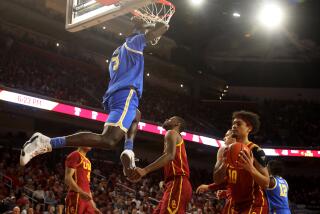Basketball and the game of life
- Share via
My ex-husband came over one night recently wearing a shirt the girls and I bought him five years ago. In embroidered letters on the left side of the chest, it read “Coach Dwayne Sims.” He was restless -- had been all week. It was the end of March, and the local basketball season was over. Not even the NCAA playoffs on TV could fill the void.
Our middle daughter, the one he coached the longest, is a senior now, finished with high school basketball. Delphine’s team was made up of girls he’s known since they were 11 years old, and they made it to the second round of the playoffs before they were eliminated. Our local university teams are done too. It’s almost time for the last high school banquet, and my ex is missing nights in the gym big-time.
He played high school basketball here in Riverside, and I kept stats for the team. I saw many of his college games, and after that, I was often in the stands when he played YMCA and pickup games.
But then his knees started to hurt, and he began working two jobs. He didn’t spend much time on the court again until Delphine began to play, when she was 10. He stayed out of her game for the first two years, watching with the rest of the parents from the bleachers, but then she got really good, along with several of her friends. He wanted back in the game.
He became assistant coach of the team, which her older sister played on as well. By the time Delphine was in eighth grade, he was head coach. They lost the city championship that year by only two points.
Dwayne is 6 foot 4 and weighs 300 pounds. He had been afraid that his size would make girls and parents fear him, but instead, because he looked so reliably the part of the coach, he rarely had to raise his voice. His advice was simple and doable. And that’s what the team wanted, someone who didn’t scream at players or take them out for the smallest infraction. Someone who was so low-key that he didn’t even learn their names for a long time. “D, tell the one whose grandma drives the Escalade to go in for P’s daughter,” he’d say to our kids, who had to translate.
When the girls apologized for fouling, he was quick to console them: “You ain’t foulin’, you ain’t playin’.” He yelled minimal instructions: “Watch the trap!” “Box out!” And he never got a technical. “Y’all know what to do,” he’d say to the girls. “I’m just sittin’ here.”
And then there were his two favorite shouts: “Look up!” “Get back!”
Look up when you get the rebound or begin to dribble, because someone is probably already under the basket, and you’ll have an easy layup. Cherry-picking, he loves to point out, is not something to be ashamed of. And get back, because on defense there had better always be one person who races back after a shot so the home basket is not completely unguarded.
This spring, I began to hear his advice in my head as I drove to work or on errands or to take our daughter to practice. “Look up!” We hardly ever do. We look at the driver we think is too slow, the train stopping our progress, the back seat where kids argue or ignore us, the rear-view mirror where we check our hair or teeth.
I started to look up. The road I have driven literally hundreds of times skirts an arroyo, and in the morning, I noticed for the first time how fog lingers there like dragon breath. I saw palm trees washed clean by recent rains and actually sparkling like giant toothbrushes bent sideways by the wind. I saw huge boulders like rock sugar on the foothills where I played as a child.
“Get back!” I started saying to myself. You have to race back and be ready for the next onslaught -- the presentation, the class, the PTA meeting, the lunch, the bills -- or you might as well give up.
This month, our youngest started tennis, and though Dwayne is bereft at the lack of basketball, he attends her matches. At one recently, sitting outside on the metal benches, Dwayne pored over the newspaper trying to find a basketball game to attend. “You should just go home and get some sleep,” I said. He’d worked a graveyard shift the night before. But he was desperate. “It’s almost baseball season,” he groaned. Our basketball-playing daughter, beside him, cracked up at the utter despondency in his voice.
He wonders aloud if she might play in college and whether it will be close enough for him to drive there to see the games. I want to tell him how much his words have meant to me, because every day when I’m walking the dog or driving to work, I hear them, and I see woodpeckers in the trees, and the pale golden spray of dates, and then I feel capable of getting back to survival.



